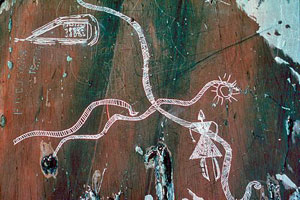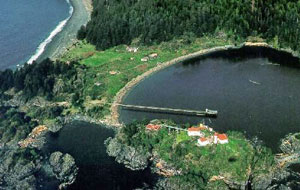Indigenous Heritage
This June 21, events will be held from coast to coast to
celebrate National Indigenous Peoples Day. A rich Indigenous
culture in Canada is evident in the names of many Canadian cities
and provinces including Manitoba, Ontario, and
Saskatchewan. Their culture is an integral part of
Canada. First Nations, Métis and Inuit communities span the
entire country and are a vital aspect of Canada's culture.
The influence of Indigenous heritage is evident in the numerous
historic places associated with Indigenous peoples listed on the
Canadian Register of Historic Places. From archaeological
sites to recent built heritage, Indigenous history plays a central
role in Canada's protection of historic places. 
Archaeological evidence of ancient sites provides rich insight
into the cultural traditions of early First Nations
communities. At Nova Scotia's Kejimkujik National Historic Site,
petroglyphs (cave drawing) are part of the former Mi'kmaq villages,
thus creating a fascinating Indigenous cultural landscape.
Early images include animals, canoes, people; later drawings depict
sailing ships. Although the age of many of the petroglyphs is
not certain, the cultural landscape itself clearly portrays the
significance and longevity of First Nations culture.
The cultural heritage of another significant Indigenous group,
the Inuit is found in the Canadian Arctic. At the mouth of
the Mackenzie River, in the Northwest Territories, is the island of
Kittigazuit - home of Kittigazuit Archaeological Sites National
Historic Site. This historic place features the
remains of a village of Kittigazuit which includes ruins of winter
houses, a log cabin and an ice house. This area was
continuously used from approximately 1400 to 1900 and was the
location of the largest seasonal gathering of Inuit and was a
beluga-hunting station for the Kitigaaryungmuit - ancestors of
today's residents of Inuvik and Tuktoyuktut. The village was
also involved in the whaling industry, and associated with the
Hudson's Bay Company as the first trading post on the coast of the
western Arctic Ocean.
The endurance of First Nation's culture is also well preserved
at Yuquot National Historic Site through
its continued occupancy for over 4,300 years. Yuquot is
important as an early contact site between First Nations and
Europeans and as a meeting place for diplomacy between two
cultures. Primarily occupied by the Mowachaht/Muchalaht First
Nations, Yuquot was the social, political and economic centre for
the surrounding region. It is linked with the origin of
Nuu-chah-nulth whaling - an integral part of their culture.
In a country with vast natural resources, early contact between
Indigenous peoples and European explorers was based on the fur
trade. The Hudson's Bay Company Factor's
House in Fort Vermillion, Alberta has been recognized
for its role in the fur trade and as another meeting place between
two cultures. Fort Vermillion was an  important trading post in the northwest
because its location granted access to the Boreal forest of the
Athabasca region. Beaver, Slavey, and Cree First Nations as
well as Métis free traders frequented the Hudson's Bay Company
Factor's House. It is the last remnant of the once intensive
fur trade operation and a reflection of the significant Indigenous
involvement and contribution to North America's fur trade
industry.
important trading post in the northwest
because its location granted access to the Boreal forest of the
Athabasca region. Beaver, Slavey, and Cree First Nations as
well as Métis free traders frequented the Hudson's Bay Company
Factor's House. It is the last remnant of the once intensive
fur trade operation and a reflection of the significant Indigenous
involvement and contribution to North America's fur trade
industry.
First Nations diversity of community and culture across Canada
is highlighted in Canada's historic places, and the Canadian
Register of Historic Places attempts to capture this cultural
wealth. To celebrate National Indigenous Peoples Day, you can
search the Canadian Register to become better informed about
Indigenous cultures in Canada, and then head out to discover
first-hand the meaning and significance of First Nations, Métis,
and Inuit culture in Canadian history. For those who want to
actively participate in the celebrations, many Indigenous
communities will host ceremonies or festive events to mark their
heritage.